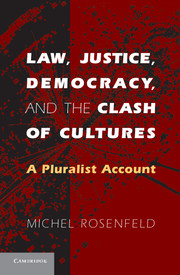Book contents
- Frontmatter
- Contents
- Introduction
- Part I Liberal Justice and Fleeting Specters of Unity
- Part II E Pluribus Unum?
- Part III Can Pluralism Thrive in Times of Stress?
- 7 Rethinking Political Rights in Times of Stress
- 8 Derrida’s Deconstructive Ethics of Difference Confronts Global Terrorism
- 9 Habermas’s Discourse Ethics of Identity and Global Terror
- 10 Conclusion
- Bibliography
- Index
10 - Conclusion
The Hopes of Pluralism in a More Unified and More Fragmented World
from Part III - Can Pluralism Thrive in Times of Stress?
Published online by Cambridge University Press: 05 June 2012
- Frontmatter
- Contents
- Introduction
- Part I Liberal Justice and Fleeting Specters of Unity
- Part II E Pluribus Unum?
- Part III Can Pluralism Thrive in Times of Stress?
- 7 Rethinking Political Rights in Times of Stress
- 8 Derrida’s Deconstructive Ethics of Difference Confronts Global Terrorism
- 9 Habermas’s Discourse Ethics of Identity and Global Terror
- 10 Conclusion
- Bibliography
- Index
Summary
The philosophical case for comprehensive pluralism advanced throughout the preceding pages is based on the conviction that normative pluralism is best under all circumstances, ranging from the non-pluralist polity to the increasingly pluralist-in fact multi-national, multi-ethnic, multi-cultural polity and the transnational arena. Even in a purely homogeneous social setting, encouragement and protection of the pursuit of multiple paths to self-realization and self-fulfillment is a clear normative imperative for comprehensive pluralism. Indeed, there are bound to be enough relevant differences among individuals even in the most non-pluralistic of socio-political settings to allow for each to fine-tune her personal journey toward self-realization, and thus enrich her experience of the good life as well as that of others who may use or build upon the conception of the good she helped to forge for her own purpose. In the best of all possible worlds, priority would be given to singularity and all conceivable differences promoted and celebrated. Moreover, by thus thrusting singularity to the fore, not only would each person be encouraged to find the best for himself, but also in the course of pursuing the call originating in his singularity, he would be likely to expand horizons and contribute to the needs or aspirations of others. If one seeks self-fulfillment in music and becomes a superb performing musician, for example, she is likely to end up enriching the experience of those who listen to her and prompt some of the latter to explore previously unthought of more well-suited paths to their own self-realization and self-fulfillment.
In the best of all possible worlds, the first negative moment of comprehensive pluralism would become the only one, and pluralism would merge into an ethics of difference akin to that propounded by Derrida. But down to earth, including in the best of all plausible intrasubjective settings, leaving the entire realm of the normative to comprehensive pluralism’s negative moment or to a Derridean ethics of difference would simply not do. And, this is the case not just because of the failings of the ethics of difference in tackling the normative challenge posed by global terrorism, which were detailed in Chapter 8. Indeed, inherent harmony among competing conceptions of the good is virtually impossible even in the most ordinary of times, and that for two principal omnipresent reasons. First, inevitably some conceptions of the good seek restriction or destruction of others as repeatedly alluded to in the course of the preceding analysis. And, second, coexistence among conceptions of the good that bear no ill will toward one another cannot continue for long without competition for scarce resources resulting in at least partial frustration of the designs of some of the conceptions involved.
- Type
- Chapter
- Information
- Law, Justice, Democracy, and the Clash of CulturesA Pluralist Account, pp. 297 - 308Publisher: Cambridge University PressPrint publication year: 2011



